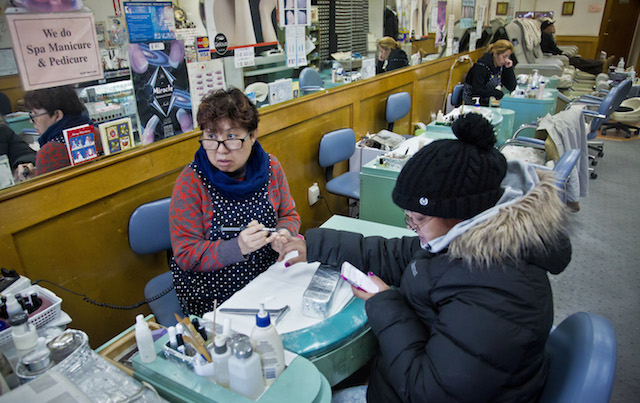Brooklyn Speaks Out On NY Times Reveal Of Underpaid Manicurists



The New York Times ran a two-part series in May written by Sarah Maslin Nir, that was a look at underpaid, exploited, and discriminated manicurists in New York City and their declining health because of the use of the ingredients in nail products. After that, a pilot program, introduced in September by the New York City public advocate’s office and backed by the Clinton Global Initiative, rolled out to ensure that nail salons are now examined and audited and fined if they show dangerous work conditions or labor abuses. All sorts of controversy began because of the series and Brooklyn is commenting too.
For some background, some of the people and scenarios Nir reported on specifically for Brooklyn are as follows and I quote:
Richard Bernstein took to NYBooks after the series was published to say that the two articles are flawed and tainted by the writer’s own discrimination. He says, “…they (the NYTimes) go on to extrapolate sweeping and unsubstantiated conclusions from what was, by their own description, a non-random sample.”
Nonetheless, this is what Brooklyn had to say:
discover for more info levitra 60 mg Oral Medications as a Smart Option for ED Treatment Most of the men with impotence start with pills, including Sildenafil Citrate, Tadalafil, Vardenafil, and Avanafil.
Karla Garcia, from Bensonhurst, “After reading the NYTimes articles, it made me feel bad and kind of guilty. I’ve always gone to nail salons and never paid attention to how nail salon workers were treated. I actually was looking for a new nail salon when the articles came out and I tried a few new places where I asked the owners and workers about the treatment of workers and I only went to one where the workers were treated well. Let’s be honest, I can DIY my own nails but I’m a slave to the nail salon.”
Annie Steele of Crown Heights talks NY Times “The Price of Nice Nails” article.
Annie Steele, from Crown Heights, “The NYTimes articles angered me because clearly workers’ rights have been getting movement in other industries but not in nail salons. I personally only get manicures and pedicures on special occasions but reading this article made me really not want to get manis and pedis at all based on how salons treat their workers.”
Tiffany Colon, from Bushwick and now in Flatbush, “I always feel kind of weird when people are working on your toes but I will say that the NYTimes articles didn’t necessarily change my mind on the nail salon. I always do try to make sure I tip very well though most people might not. It would be nice if workers are treated better.”
Alisa Metjahic, from Manhattan, Queens, Jersey, and who’s been to all sorts of salons throughout New York City, “I always kind of knew the nail salon workers were a little mistreated but I didn’t know to what extent. Now, I feel like I need to ask the owners of salons how they treat their workers so I’m not contributing to what’s happening. I feel like we should try to change the situation. It’s our responsibility as civilians and as members of society. I’m really surprised we haven’t had rights for nail salon workers until now. We can do better.”

Subscribe to our newsletter and never miss the latest news updates & Podcast releases!
